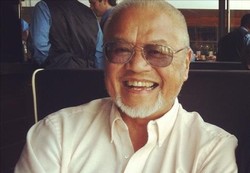The Rev. Bert Tom, 79 ― whose dedication to the Presbyterian Church (U.S.A.), community organizing skills and dogged pursuit of justice for all people earned him scores of friends, legions of admirers and not a few enemies ― was remembered Aug. 31 at a memorial service here at his beloved Presbyterian Church in Chinatown.
Tom died July 20 at his home in Medford, Ore., where he had recently moved with his wife, Julie. Last winter, he was diagnosed with acute leukemia.
Bert Tom was born in San Francisco to immigrants from Guangzhou, China. A challenge to school district leadership, he managed to graduate from George Washington High School in the city, the University of Dubuque and San Francisco State University. He earned a BD and MA from San Francisco Theological Seminary before being ordained by San Francisco Presbytery in 1960.
Tom served as pastor of Magnolia United Presbyterian Church in Riverside, Calif., before returning to San Francisco. He served on the staff of the Chinatown Church and its Cameron House ministry for eight years and then on the staffs of the former Synod of the Golden Gate and San Francisco Presbytery until his retirement in 2000.
At the General Assembly level, Bert Tom served on the General Assembly Council, with particular focus on the Racial Ethnic Ministry Unit and the Council on Church and Race. He was instrumental in the creation of the Self-Development of People program and served on the General Assembly’s Urban Strategy Task Force which developed a 10-year plan for the PC(USA)’s urban strategy.
But it was at the personal level that Bert Tom really made a difference. Too many Presbyerians to count ― including this reporter ― counted him as a friend, mentor and hero. His passion for justice and commitment to the self-development of society’s most marginalized made him a larger-than-life church leader.
At his memorial service, it was said of Bert Tom: “His faith in humanity was grounded in his belief in the goodness of all beings. His fearlessness and courage in the face of change was grounded in the transformative relationship with Christ… Bert saw mission as all about change and that mission was the primary responsibility of the church community. Bert faced change and future uncertainty with an unfailing hope because he believed deply and strongly in the pwer and strength of community and of connectionalism. Bert understood the church as the Body of Christ, in all its diversity, and that as long as that mission is accomplished together ― collectively and collaboratively ― constructive change will occur.”
In addition to Julie Chow, Bert Tom is survived by his ex-wife, Jane Clow; five children: Drew, Eric, David, Jordan and Whittney; and nine grandchildren.
Bert Tom frequently said “what matters is what God’s doing in the streets and alleyways of neighborhoods and cities. It’s not the religious vocabulary we use that matters, but how we live our lives for the sake of others.”
What a guy.
Material for this story furnished by the Rev. Joey Lee, executive presbyter, Presbytery of San Jose.

